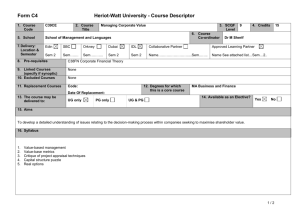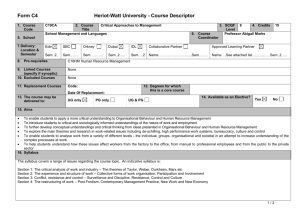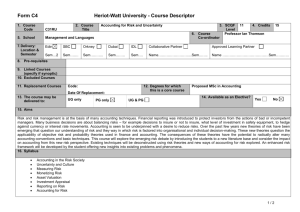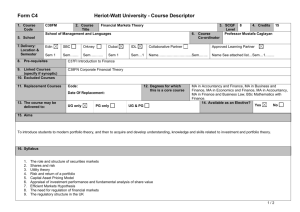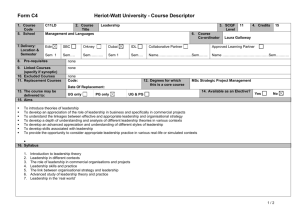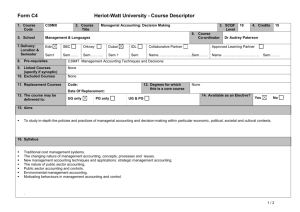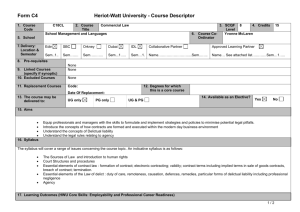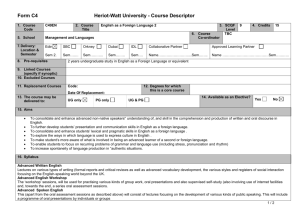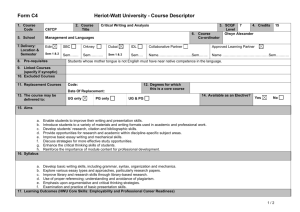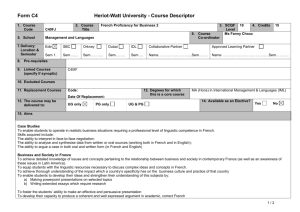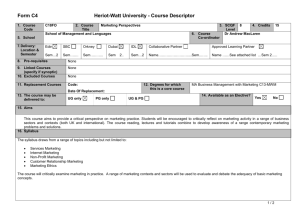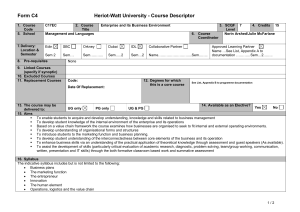C20AG_C4 - Heriot
advertisement
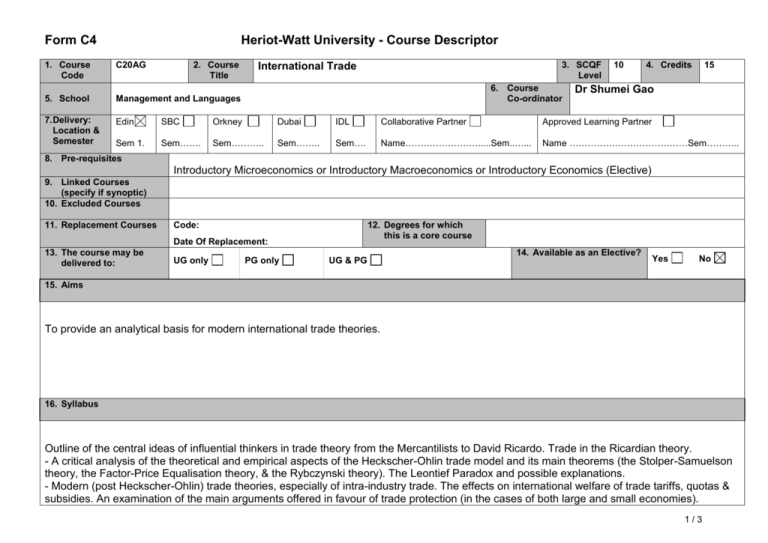
Form C4 Heriot-Watt University - Course Descriptor 1. Course Code C20AG 2. Course Title 3. SCQF Level 5. School Management and Languages 7. Delivery: Location & Semester Edin SBC Orkney Dubai IDL Collaborative Partner Approved Learning Partner Sem 1. Sem……. Sem……….. Sem…….. Sem…. Name…………………….....Sem..…... Name …………………………………Sem……….. International Trade 6. Course Co-ordinator 10 4. Credits 15 Dr Shumei Gao 8. Pre-requisites Introductory Microeconomics or Introductory Macroeconomics or Introductory Economics (Elective) 9. Linked Courses (specify if synoptic) 10. Excluded Courses 11. Replacement Courses Code: 12. Degrees for which this is a core course Date Of Replacement: 13. The course may be delivered to: UG only PG only UG & PG 14. Available as an Elective? Yes No 15. Aims To provide an analytical basis for modern international trade theories. 16. Syllabus Outline of the central ideas of influential thinkers in trade theory from the Mercantilists to David Ricardo. Trade in the Ricardian theory. - A critical analysis of the theoretical and empirical aspects of the Heckscher-Ohlin trade model and its main theorems (the Stolper-Samuelson theory, the Factor-Price Equalisation theory, & the Rybczynski theory). The Leontief Paradox and possible explanations. - Modern (post Heckscher-Ohlin) trade theories, especially of intra-industry trade. The effects on international welfare of trade tariffs, quotas & subsidies. An examination of the main arguments offered in favour of trade protection (in the cases of both large and small economies). 1/3 Form C4 Heriot-Watt University - Course Descriptor - An examination of modern customs union theory; the distinction between trade creation & trade diversion. - An introduction to the study of the development of international economic institutions designed to assist international trade by ensuring the existence & stability of the necessary policy and legal conditions. - A study of the objectives of the European Union’s trade policy. 17. Learning Outcomes (HWU Core Skills: Employability and Professional Career Readiness) Subject Mastery Understanding, Knowledge and Cognitive Skills Scholarship, Enquiry and Research (Research-Informed Learning) On completion of this course learners will be able to: -understand modern trade theories and use these theories relevantly in the analysis of empirical problems. -develop critical judgment to enable evaluation of competing views on the nature and consequences of international trade. -synthesise material from different sources in the examination of economic and social questions connected with international trade. 2/3 Form C4 Heriot-Watt University - Course Descriptor Personal Abilities Industrial, Commercial & Professional Practice Autonomy, Accountability & Working with Others Communication, Numeracy & ICT The course aims to develop the following valuable personal skills: - the ability to discern and critically appraise the main issues in economic-related controversies and to assess the internal coherence and factual accuracy of competing economic arguments. - the ability to combine appropriately quantitative methods and verbal fluency to generate convincing and cogent arguments concerning economic, social and moral issues. - the ability to appreciate the important role of foundational economic concepts including “opportunity cost” and “relative scarcity” in the understanding of national and international economic circumstances. -the ability to understand that different scientific theories (including those in economics) may rest upon different philosophical presuppositions about the fundamental nature of the events under study. - the ability to work independently (including the ability to set one’s own short-run goals) and collaboratively with others in a co-operating group. -the ability to communicate to others the results of scientific research. -the ability to handle effectively data and the ability to use a wide range of generalist skills, such as word-processing, spreadsheet manipulation and the use of online informational search mechanisms. 18. Assessment Methods Method 19. Re-assessment Methods Duration of Exam Weighting (%) Synoptic courses? Method (if applicable) Coursework Examination 2 hours Duration of Exam (if applicable) 30% 70% None Examination 2 hours 20. Date and Version Date of Proposal Date of Approval by School Committee Date of Implementation Version Number 3/3 Diet(s)
